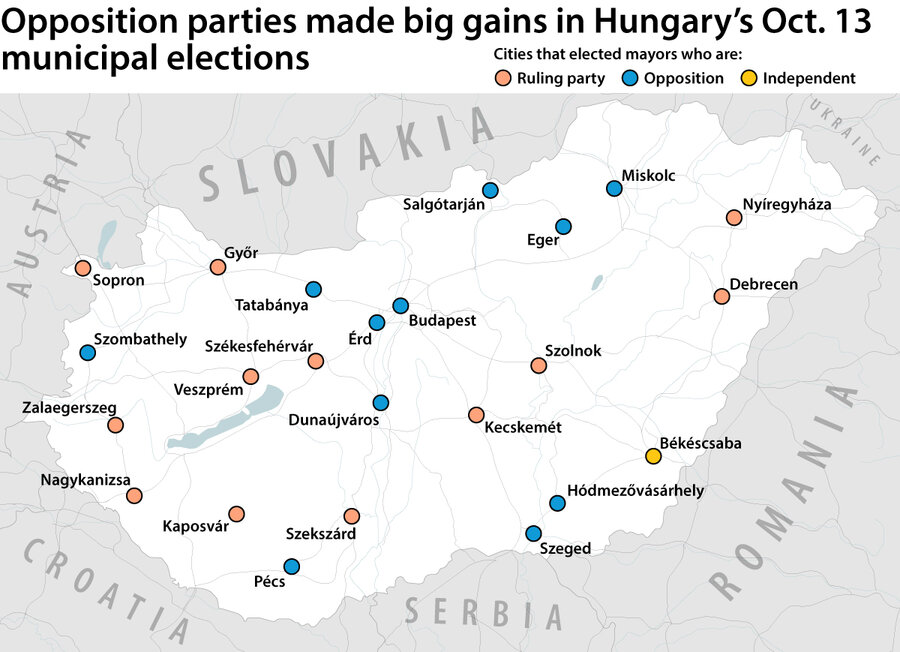Political thaw in Hungary? Orbán loses his lock on cities.
Loading...
| Budapest, Hungary
People in the streets of Budapest, Hungary, have been in a celebratory mood since local elections boosted the opposition in a country that has moved in an autocratic direction under Prime Minister Viktor Orbán’s leadership. The gains, coming after nine years in which Mr. Orbán and his party won all nationwide elections, were seen as evidence that the political square can still be contested, even amid challenges posed by fake news and asymmetrical power structures.
“The surprising victory – if exploited wisely by the opposition forces – will bring politics back into Hungary,” says Daniel Hegedüs, a fellow for Central Europe at the German Marshall Fund of the United States.
The winds of change were strongest in the capital where the opposition took 14 out of 23 districts in the Oct. 13 vote. Another surprise was their victory in 10 out of 23 of Hungary’s main cities. The results, analysts concur, are in part a testament to the capacity of a fragmented opposition to set aside their differences. “There is no alternative,” says Krisztina Baranyi, who was elected mayor of Budapest’s ninth district.
Why We Wrote This
For democracies to function, there must be legitimate political competition, free from interference. That hasn’t been the case in Hungary for years. But the country’s opposition has found a way to revitalize its politics.
It may only be October. But for many in Budapest, Christmas – Karácsony, in Hungarian – has arrived early this year.
Specifically, it has arrived with the mayoral victory of Gergely Karácsony, the opposition challenger who surprised pollsters and squarely defeated the ruling-party incumbent Istvan Tarlos in the mayoral race for Budapest. People in the streets of the Hungarian capital are wishing each other a happy Christmas in a celebratory mood.
Mr. Karácsony’s victory was the foremost of a series of municipal wins across the country, as opposition parties banded together to break a monopoly of power held by Prime Minister Viktor Orbán, who has moved in an autocratic direction to fulfill his so-called illiberal democracy. The gains, coming after nine years in which Mr. Orbán and his party, Fidesz, won all nationwide elections, were seen as evidence that the political square can still be contested, even amid challenges posed by fake news and asymmetrical power structures.
Why We Wrote This
For democracies to function, there must be legitimate political competition, free from interference. That hasn’t been the case in Hungary for years. But the country’s opposition has found a way to revitalize its politics.
“The surprising victory - if exploited wisely by the opposition forces - will bring politics back into Hungary,” says Daniel Hegedüs, fellow for Central Europe at the German Marshall Fund of the United States. “It allows the opposition to build new structures, provides them badly needed resources and the opportunity to look into past corruption patterns of Fidesz politicians in the cities conquered from the governing party.”
The winds of change were strongest in the capital where the opposition took 14 out of 23 districts in the Oct. 13 vote. Another surprise was their victory in 10 out of 23 Hungary’s main cities. The results, analysts concur, are in part a testament to the capacity of a fragmented opposition to set aside their differences. In key constituencies, the six parties rallied behind one candidate, which can make all the difference in a single round, first-past-the-post electoral system.
“In order to beat Orbán’s regime, there is no alternative but the national cooperation of all opposition,” says Krisztina Baranyi, who was elected as the mayor of Budapest’s ninth district.
Fidesz, which came to power in 2010 and has won seven elections since, still has the upper hand. It holds the majority in parliament and remains the clear favorite in rural areas. What the Oct. 13 poll revealed is a sharpened urban/rural divide not unlike that seen in the U.S. “The big cities are opposition islands in otherwise Fidesz-held rural ocean,” says Péter Krekó, director of the Political Capital Institute in Budapest.
Unexpected developments also played a role. A sex and drugs scandal erupted around Zsolt Borkai, the Fidesz mayoral candidate in Győr. The party did not kick him out, nor did he resign, and Mr. Borkai eventually won his race. But the scandal did hurt the image of Fidesz countrywide, discouraging its voters and galvanizing opposition backers.
“We cannot take it for granted that this victory will automatically lead to a defeated Fidesz in 2022,” says Mr. Krekó, also a Futures Fellow at the Institute for Human Sciences in Vienna. “The situation of the new mayors will be quite difficult. ... On the other hand, they will have some chance if they can have some EU funds to show that there is a world without Fidesz and that they can run cities successfully.”
One of the lessons that Fidesz will take away from this setback is that the opposition is still too strong and has too much weight in the media. A tightening of the screws is more likely than any kind of softening in the years ahead. But at a minimum, the elections served to puncture Mr. Orbán’s aura of invincibility.
“Although the election results contributed to the opposition’s revival, the power structures of the illiberal Orbán regime are not shaken,” says Mr. Hegedüs. “Fidesz still enjoys the support of approximately every second active voter who would certainly cast their ballot at the next election.”
Editor's note: The story has been updated to correct a misquote of Mr. Krekó.








